

Coping one day and crying the next: Work-related burnout is real. SINGAPORE: One day at work, Ms Jamuna Raj was striking off “to-dos” from a neat hand-written list, thinking she had a lid on all her tasks at work.
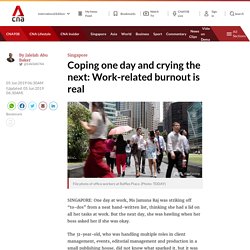
But the next day, she was bawling when her boss asked her if she was okay. The 31-year-old, who was handling multiple roles in client management, events, editorial management and production in a small publishing house, did not know what sparked it, but it was the start of her journey towards realising that she was experiencing burnout. “I was striking the to-dos off, but for every one that I did, there were five more. Still, because I was striking things out, I thought I could handle it,” she told CNA. At the time, she had multiple deadlines looming ahead of her. Her boss had checked on her because she had changed and her colleagues noticed it, said Ms Jamuna, a Singaporean who lives in Melbourne. “As soon as he (her boss) asked me that, I started bawling. READ: Commentary: What’s behind burnout? “I went back, and I saw my emails, I cried. Singapore's most stressed out millennials on working long hours and dealing with anxiety at work.
I can't remember the last time I heard a young Singaporean say that they were genuinely excited about the prospect of getting into the office in the morning, even if they were deeply passionate about their field of work.
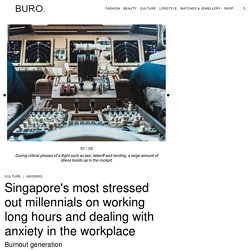
Instead, often times, they expose a toxic work environment where stress and anxiety skyrocket while self-confidence plummets as a result of slave-driving superiors, a overwhelming workload, miserable working hours that extend far beyond the standard 9-to-5 with no reward, and even the possibility of retrenchment in the near future. If all the above sounds a little too dire to be true, you'll only need to look at the findings of the 2019 Cigna Well-Being Survey, which revealed a staggering 92 per cent of of working Singaporeans feel stressed in the workplace with debilitating effects such as lowered morale. If there's one thing I've taken away from their responses, it's that all of us have the ability to manage stress and anxiety. TODAYonline: Sleep-deprived Singaporean workers among most stressed globally: Survey Read more at.
SINGAPORE — Singaporeans are not only sleep deprived, but they are also among the most stressed at work globally, according to a survey by health service company Cigna released on Tuesday (Mar 26).

Nearly 92 per cent of Singaporeans surveyed were stressed from work, which was higher than the global average of 84 per cent. Of this group, 13 per cent said that the stress they faced was unmanageable. Singaporeans’ physical wellness index also dipped by 4.4 percentage points from last year, which the survey attributed to an increase in sleepless nights. Of the 23 markets surveyed, Singapore had the fifth lowest wellness index, which was measured across five key indices — family, financial, physical, social and work. Singapore fell by a place from last year as its wellness index went down by 1.7 points to 57.8. The survey collated about 13,200 responses from over 24 countries, with a sample of 502 respondents in Singapore. A whopping 92% of working Singaporeans are stressed – and women are prioritising families over themselves, study finds, Business Insider - Business Insider Singapore.
Pexels If you’re feeling stressed at work, you’re not alone.
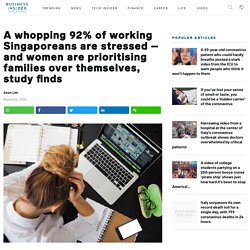
Singapore spends $3.1 billion on stress-related illnesses annually: Study, Health News. SINGAPORE - A study has found that Singapore spends about US$2.3 billion (S$3.1 billion), or 18 per cent, of its total healthcare expenditure on stress-related illnesses annually.
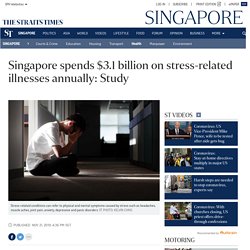
This put the nation's proportion of expenditure on stress-related illnesses second-highest out of the nine regions studied in the report, coming just 0.8 per cent behind Australia's 18.8 per cent. The other seven regions were Hong Kong, South Korea, Taiwan, Thailand, United Arab Emirates, the United Kingdom and the United States. The report, which was produced by healthcare consultancy firm Asia Care Group on behalf of health insurance and services company Cigna, was published on Thursday (Nov 21). More Singapore workers hit by stress-related illnesses since downturn: Survey, Health News. SINGAPORE - Economic volatility has increased pressure on Singaporean workers with 67 per cent reporting that they are seeing more stress-related illness since the downturn.
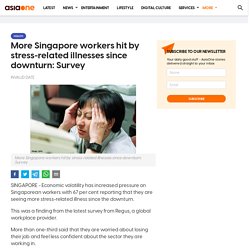
This was a finding from the latest survey from Regus, a global workplace provider. More than one-third said that they are worried about losing their job and feel less confident about the sector they are working in. The study found that 34 per cent of Singaporean workers are losing sleep worrying about work, and 40 per cent of respondents reported that their family and friends have noticed they are stressed by work. Stress. External sources of stress could include: Personal problemsWork problemsRelationship difficultiesPressure of studiesHealth problemsFinancial crisisUnemploymentLosses, e.g. bereavementUnexpected newsDaily hassles Internal sources of stress could include the following:
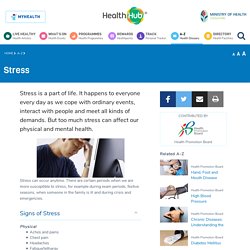
The Basics of Stress. Stress is a situation that triggers a particular biological response.
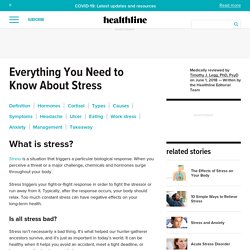
When you perceive a threat or a major challenge, chemicals and hormones surge throughout your body. Stress triggers your fight-or-flight response in order to fight the stressor or run away from it. Typically, after the response occurs, your body should relax. Too much constant stress can have negative effects on your long-term health. Is all stress bad? Stress isn’t necessarily a bad thing. We all feel stressed at times, but what one person finds stressful may be very different from what another finds stressful. Managing Stress - Brainsmart - BBC. How stress affects your brain - Madhumita Murgia. How stress affects your body - Sharon Horesh Bergquist. How stress is killing us and how you can stop it - Thijs Launspach - TEDxUniversiteitVanAmsterdam. Coping with Stress.
Overcoming Stress. Everybody has it, and everybody talks about it, but nobody really knows what stress is.
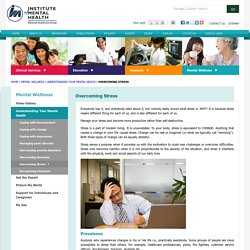
WHY? It is because stress means different thing for each of us, and is also different for each of us. Manage your stress and become more productive rather than self-destructive. Stress is a part of modern living. It is unavoidable. Stress serves a purpose when it provides us with the motivation to scale new challenges or overcome difficulties.
Prevalence Anybody who experiences changes in his or her life i.e., practically everybody. Stress can occur anytime. Symptoms / What to expect Physical: Aches & painsHeadachesFatigue/LethargyPalpitationStomach upsetsDizzinessSexual Dysfunction Emotional: Anxious/WorryTensedIrritable/JumpyDepressed/MoodyFeeling overwhelmedRestless Cognitive: ForgetfulnessPoor concentrationMental blockDifficulty in organizing & making decisions Behavioural: Sleep problemsCryingPoor appetiteFalling ill- cold, coughsWithdrawalSmoking/Drinking excessively Causes. The best ways of coping with stress. 10 Breathing Exercises to Try: For Stress, Training & Lung Capacity. If you’re interested in trying breathing exercises to reduce stress or anxiety, or improve your lung function, we’ve got 10 different ones to sample.
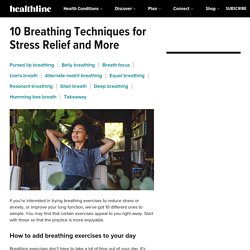
You may find that certain exercises appeal to you right away. Start with those so that the practice is more enjoyable. How to add breathing exercises to your day Breathing exercises don’t have to take a lot of time out of your day. It’s really just about setting aside some time to pay attention to your breathing. Begin with just 5 minutes a day, and increase your time as the exercise becomes easier and more comfortable. This simple breathing technique makes you slow down your pace of breathing by having you apply deliberate effort in each breath. You can practice pursed lip breathing at any time. Stress Management - Singapore Heart Foundation. Stress is part and parcel of everyday life as we deal with challenges posed by work, family commitments, financial obligations, and social relationships.
While a small to moderate amount of stress may actually stimulate us to perform better, excessive stress or stress which endures over a prolonged period of time can damage our health. In this context, there is growing evidence which suggests that stress has a significant impact on our risk of developing heart disease. Read more: Stress as a Risk Factor for Cardiovascular Disease Ways in which you can minimise the potentially harmful effects of stress include: 10 Easy Ways to Manage Stress. Everyone experiences stress as a result of the life demands that we manage from day to day. Whilst stress can motivate us and help us achieve our goals, when experienced at high levels or for long periods of time it can have a negative effect on your health. While it may not be possible to eliminate all the stresses in your life, you could seek out ways to manage stress in your daily life.
Here are 10 easy ways that could help you in managing stress. 1. Spread Out the Changes in Your Life Give yourself time to adjust from one change to another. Smash and bash: Going crazy in Singapore's first rage room, Lifestyle News. Armed with a baseball bat, some enter the concrete-walled room and pause, hesitant to put bat to object. Yet others go in and immediately start smashing everything in sight, emitting loud roars that can be heard down the hallway. Welcome to The Fragment Room, Singapore's first rage room, where stressed-out people can relieve their pent-up frustration by smashing wine bottles, plates, laptops and television sets. At the nondescript, 951 sq ft establishment in Balestier, customers are promised a safe space to wreak havoc and blow off steam.
And it seems that Singaporeans are a tense bunch. Since opening last Tuesday, about 100 customers have signed up for a session, says founder Royce Tan, 24. A 30-minute package for one person costs $38 and includes the use of a baseball bat and a crate of breakables, such as ceramic plates and bowls, glasses and bottles. They can also bring their own unwanted items from home, but have to pay an additional cleanup fee. •More details at thefragmentroom.com.